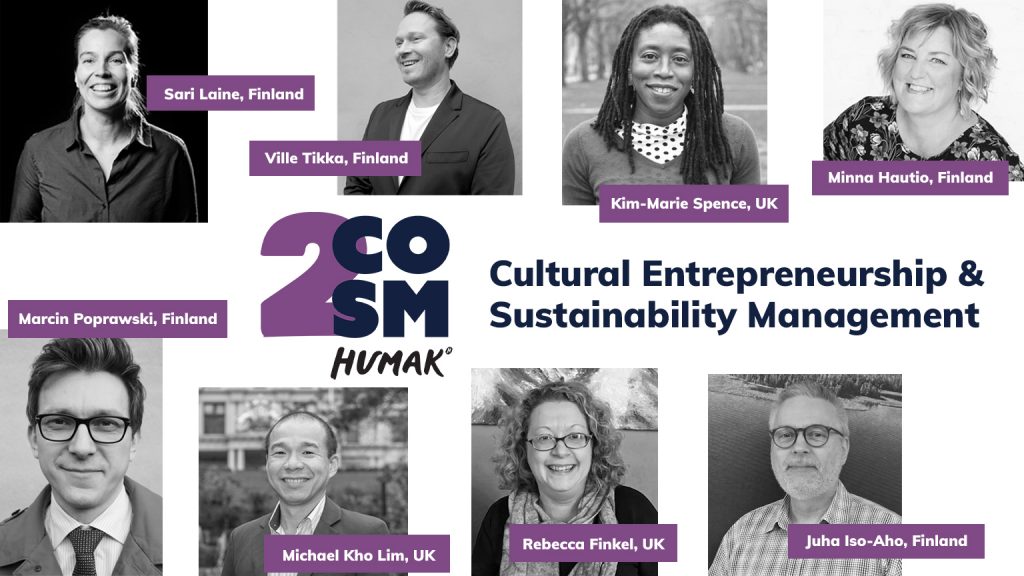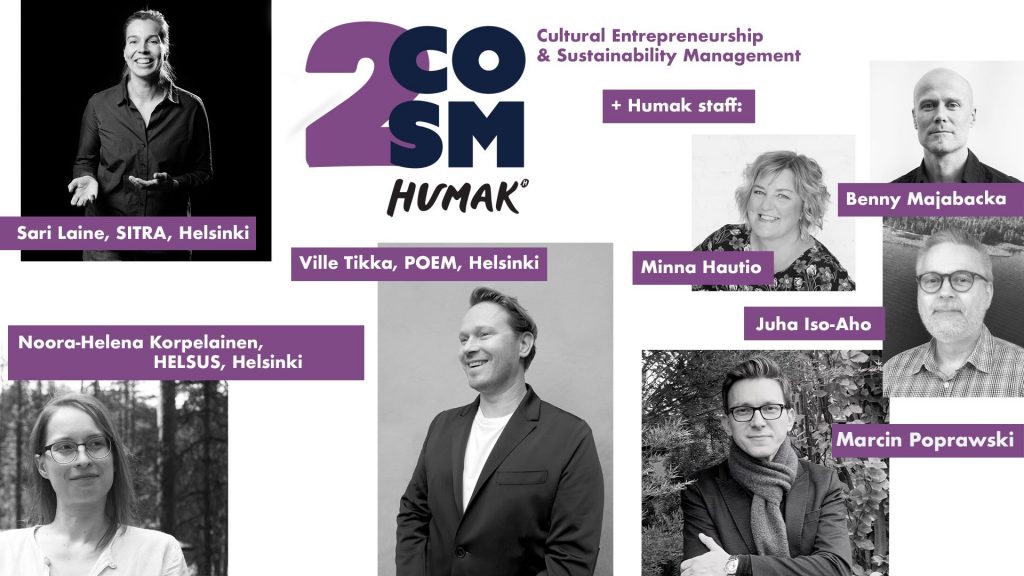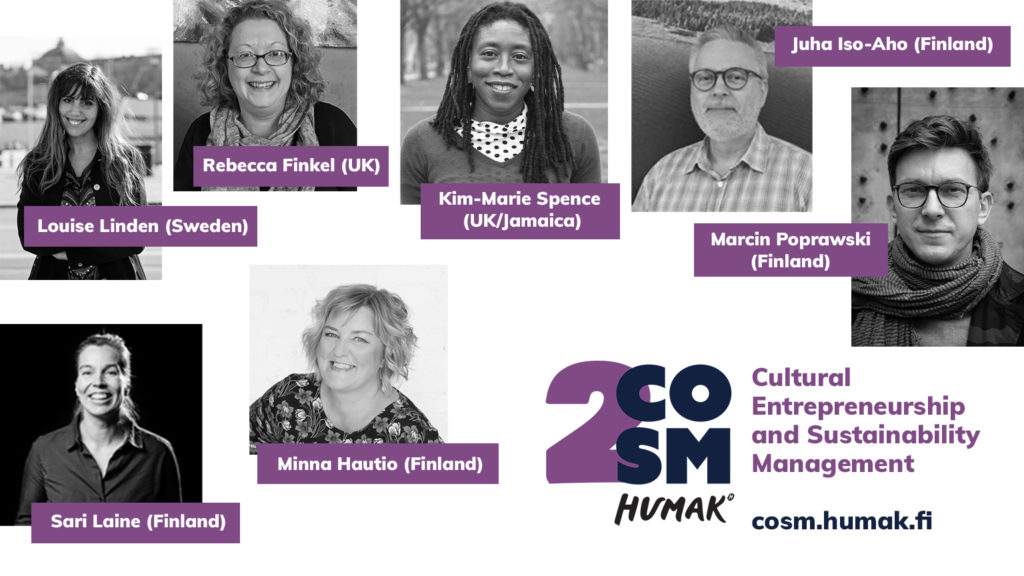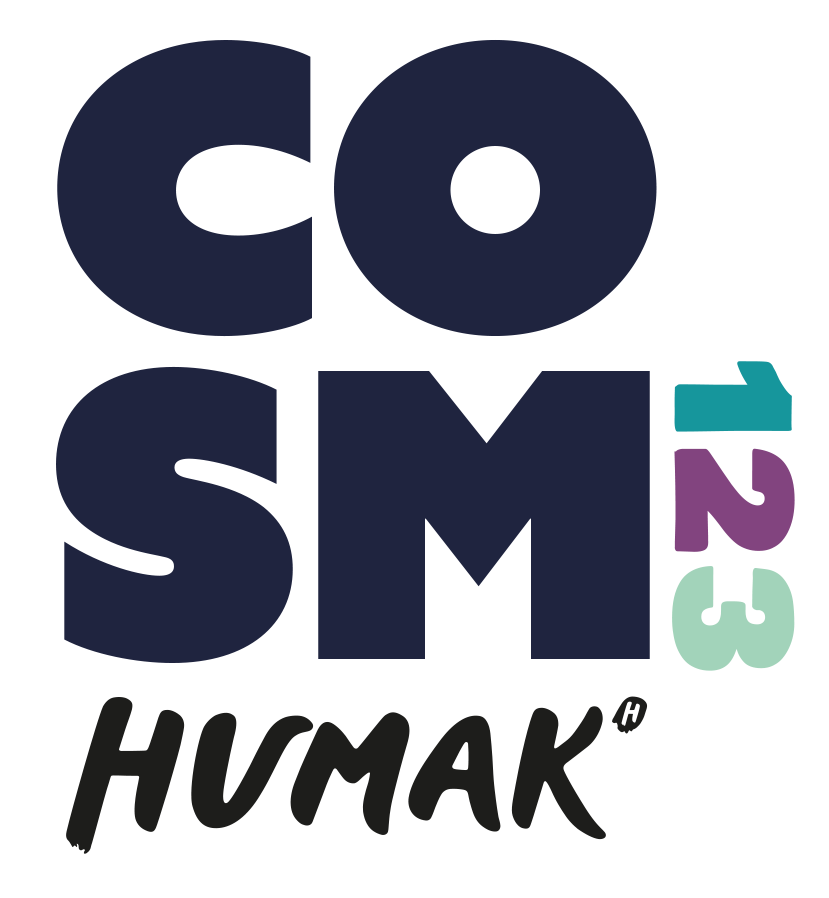COSM 2 “Cultural Entrepreneurship and Sustainability Management” is a 5 ECTS MA level course that provides an international and cross-disciplinary perspective on sustainability values and practical dimensions of cultural managers’ work. There are three central domains of cultural producers’ activities discussed in the course: festivals, and local communities-oriented productions and other independent entrepreneurial initiatives in rural and urban environments.
This course can be selected as a separate unit or as a second part of the whole COSM series of three courses (15 ECTS). This is the revised version of the course that went through the pilot stage of testing in Spring 2021 and was highly evaluated by all participants. As a blended learning process, it comprises of: (a) 4 sessions with international and Finnish guest lecturers, facilitated by the host lecturer of the course, Dr Marcin Poprawski; (b) the access to the interactive Hoodle platform with the content to be studied by participants. The platform gives access to literature files, video materials, and digital sources. Webinars 1 and 4 are (give hybrid learning options) organised in the classroom of Humak UAS in Helsinki and broadcasted life online as a zoom session. Webinars 2 and 3 are entirely online zoom webinars.
The fifth edition of COSM 2 course will start 26.10.2023 (with the registration deadline of 16.10.2023 for the second course). You can register on Humak University Open University Web Shop. Contact Us to get more information!
Amongst carefully selected and invited experts and guest lecturers who share their experience and knowledge through COSM 2 are inspiring individuals from Finland, the United Kingdom, Jamaica and Sweden.
Guest lecturers (6th edition):
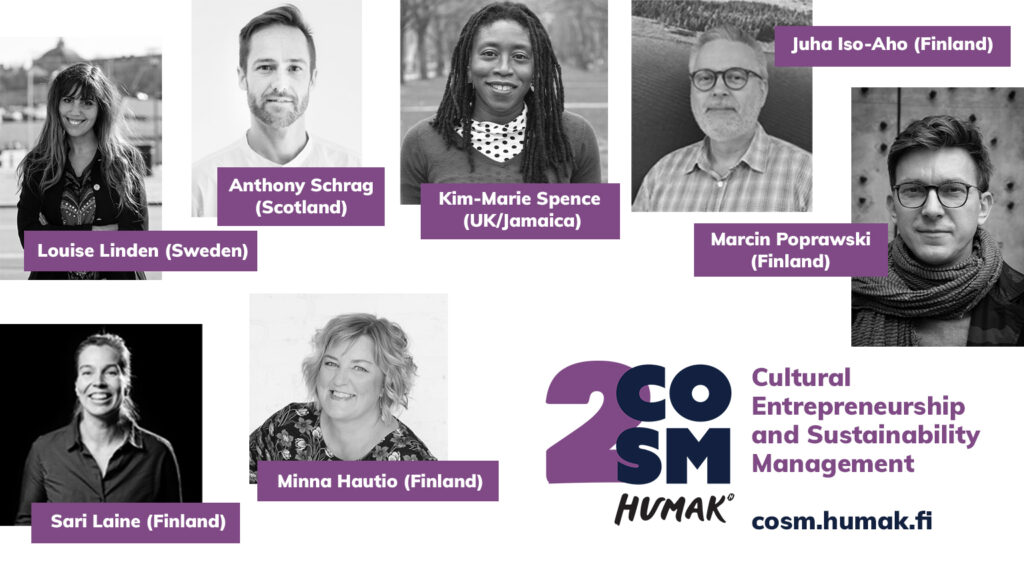
Anthony Schrag (Queen Margaret University Edinburgh, UK)
Minna Hautio (Humak University of Applied Sciences, Helsinki, Finland)
Kim – Marie Spence (Queen’s University, Belfast, UK)
Juha Iso-Aho (Humak University of Applied Sciences, Helsinki, Finland)
Sari Laine (Sitra, Helsinki, Finland)
Louise Linden (LiveGreen Festivals, Stockholm, Sweden)
Host lecturer:
Marcin Poprawski (Humak University of Applied Sciences, Helsinki, Finland
Content
- Cultural Entrepreneurship and Sustainability Values
- Sustainability and the nature of Cultural Projects and Creative Processes
- Festivals and Sustainability
- Cultural NGOs as Sustainability actors
- Creative Partnerships for Environmental, Social and Economic Sustainability
Objectives
Students understand the issues of sustainability from the point of view of cultural entrepreneurs and NGOs, as well as local and independent initiatives and festivals organizers. The course aim is to activate different streams of students’ activity regarding culture & sustainability values: interaction, cooperation, reflection, written argumentation and dialogue in conversation. The course is a safe space for questioning the answers and providing solutions regarding cultural entrepreneurship, festivals, independent cultural initiatives, and cultural professionals’ role in balancing their ecosystems.
After completion of the course the participant:
- can recognize sustainability related challenges and unsustainable practices in cultural and creative entrepreneurial entities, cultural production of festivals and local communities oriented cultural projects,
- can share, interact, reflect, write, and advocate balanced solutions regarding specific sustainability related issues in festival productions, independent cultural activities and local cultural ecosystems related cultural projects in domestic and international contexts,
- can apply her/his knowledge on key sustainability values and solutions in the festival production area and festival related cooperation – with respect to the local cultural ecosystems’ conditions,
- can fairly cooperate in the local cultural ecosystem and organize well balanced local communities-oriented activities and projects,
Evaluation
1-5 Finnish grading scale; assignment formats: groupwork, readings & discussion sessions, short essay, individual application plan of the course content;
COSM 2 schedule in the Autumn 2023 (6th ed.)
- 26.10.2023 hybrid session: on the campus classroom in Helsinki (Humak UAS, Ilkantie 4) 13:00 – 17:00 EET (+ online broadcast, interactive session – recorded)
- 17.11.2023 online session, 13:00 – 17:00 EET (interactive session – recorded)
- 21.11.2023 online session, 13:00 – 17:00 EET (interactive session – recorded)
- 5.12.2023 hybrid session: on the campus classroom in Helsinki (Humak UAS, Ilkantie 4) 13:00 – 17:00 EET (+ online broadcast, interactive session – recorded)
Experiences and testimonials of participants of the first edition of COSM 2 (Spring 2021):
This course gave me a deeper understanding of the different aspects of sustainability, especially in the NGO sector. It is a source of endless information. We had very inspiring guest lecturers. Group work was great platform for discussions. My knowledge and awareness of this wide topic increased significantly. Pia Repo
During COSM 2 I was often able to reflect on my own experience in my small hometown in Germany and how the theater I am part of succeeds in transmitting cultural sustainability. It helped me in valuing more what we are doing as a cultural organization in my hometown, and I feel that it will also help other members of the organization in recognizing the importance of their voluntary work. The associations I had with my own experience during course sessions while discussing the pre-reading papers, lead me to see the voluntary work I do for our theater in a new light. I knew that the community values what we do, but I never thought of acknowledging that we are fostering actually cultural sustainability in our small-town community. Sustainability is not only about carbon emissions and green energy, but also about local cultural identity, local cultural practices and intergenerational transmission of cultural values and believes. Intergenerational learning is something beautiful and I wish for everyone to experience it. Transferring knowledge and cultural practices in this way has enriched my life. Through COSM 2 I came to realize, that it is actually a great example of cultural sustainability. Lena Hüttl
The teamwork model developed is fantastic. It made it possible to internalize and learn a completely insane amount of information in such a short time. Drilling alone would have taken all the power, and learning would not have been so effective. This method of giving space to learning is the best example of the principles of sustainable development in teaching. In this course I have understood perhaps more than ever the principles of sustainability. The teamwork has been fruitful, and I think I have already been able to implement the tools of sustainability in my own work. The course brings out the best in each of us. Mayreth Wolff
I enjoyed the structure of the course, especially working in the group. Teammates of our group helped me with my questions. I learned much of myself, my studying habits, and get a clearer vision of my future practices. Cultural sustainability shows itself to me as a very broad and appropriate subject to study and implement in the field. Well, I have developed and learned how to express myself and my thoughts of this subject and how it could be related in entrepreneurship in the field of Creative and Cultural Industry with so many levels and approaches. I graded this course 5/5 for myself relying on my learning process and thoughts shared to other students. No more marketing speeches 🙂 but humanistic approaches in more multidimensional perspective. COSM 2 entrepreneurial sustainability education in a wider perspective than “please, recycle your plastics” is necessary. Sofia Palmio
This course gave many good tools and inspiration to my work. COSM should be obligatory to all. Tuula Hänninen
The assignments were interesting and different from the COSM 1 course: reading, reading conversations, chewing things up. On the other hand, a lot of examples of special and working projects. All in all, the COSM courses have been extremely important, the most essential things have come up in these courses because the world is viewed so holistically! This course should be compulsory!!! The COSM 2 course, both the speakers and the texts, offered us many examples, or rather success stories of local, small scale action and events that had recreated local valuation of common place and community through art. Cultural producers should more often have the courage to go local. If cultural producers want to act in the frontline of sustainable development, we need to have a clear vision of our role and the future we create. Therefore, all our actions should be guided by questions like ‘who we are’, ‘what the world is like’, ‘what it is to be a human’, and ‘what is good and bad’. In the end, it is about knowledge and self-understanding. As we are meaning-makers in the true sense of the word, we should not feel insecure and prepare for probable futures, but anchor according to what is desirable and sustainable. Salla Raunio
Past editions’ guest lecturers:
